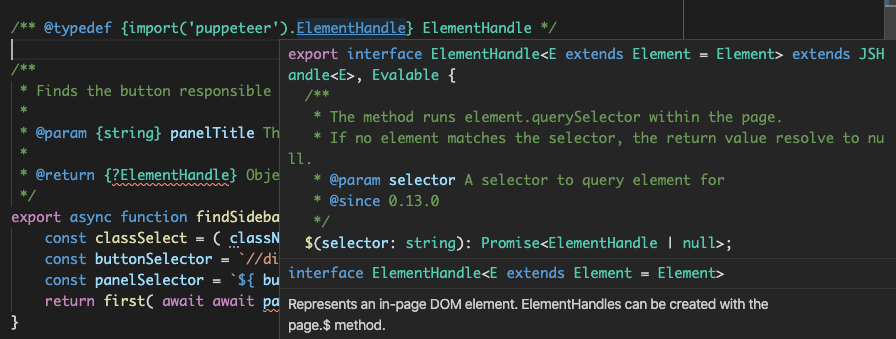-
Notifications
You must be signed in to change notification settings - Fork 4.3k
New issue
Have a question about this project? Sign up for a free GitHub account to open an issue and contact its maintainers and the community.
By clicking “Sign up for GitHub”, you agree to our terms of service and privacy statement. We’ll occasionally send you account related emails.
Already on GitHub? Sign in to your account
ESLint plugin: Remove temporary listed types for TypeScript validation (p. 1) #18808
Conversation
| @@ -15,6 +15,8 @@ import { compose } from '@wordpress/compose'; | |||
| */ | |||
| import withRegistryProvider from './with-registry-provider'; | |||
|
|
|||
| /** @typedef {import('@wordpress/data').WPDataRegistry} WPDataRegistry */ | |||
There was a problem hiding this comment.
Choose a reason for hiding this comment
The reason will be displayed to describe this comment to others. Learn more.
It's hard to tell.. are these actually resolving to anything? When I evaluate them in the editor, it just shows as the fallback "any" type.
It's something where I think just like our modules have a public API for functions, etc, we'll want to see how to expose the types as part of the public interface. It seems like this can work by default when the typedef is defined in the entry point file of a module, but if it's not, we'll need to figure out a way to "re-export" it (I think it's enough to do the typedef aliasing in the entry point file).
I guess in any case, this helps avoid having the whitelist while still making the linter happy, then we can solve the problem of the public types definitions separately.
There was a problem hiding this comment.
Choose a reason for hiding this comment
The reason will be displayed to describe this comment to others. Learn more.
I need to start using the proper IDE first to feel the experience 😂
How about we put all type definitions in the root index.js file of each package and import in all places where they are used? It should make it easier to manage.
There was a problem hiding this comment.
Choose a reason for hiding this comment
The reason will be displayed to describe this comment to others. Learn more.
I see what you mean. The issue I see is that sometimes those imports are resolved with DefinitelyTyped, so I guess it should be tackled separately. Well, I opened Visual Studio Code for the first time since I don't remember 😅
I tried two things:
- re-import the existing definition from the
index.jsfile but it didn't work - moving definitions to
index.jsand referencing them for@wordpress/datafrom there worked for all packages, but it didn't work for@wordpress/elementwhen I used the same technique
| @@ -3,12 +3,14 @@ | |||
| */ | |||
| import { first } from 'lodash'; | |||
|
|
|||
| /** @typedef {import('./puppeteer').ElementHandle} ElementHandle */ | |||
There was a problem hiding this comment.
Choose a reason for hiding this comment
The reason will be displayed to describe this comment to others. Learn more.
Is this meant to be a relative path? Or should it be import('puppeteer') ?
I think once we have these files included in tsconfig.json, we should start to get errors for these issues.
| /** @typedef {import('./puppeteer').ElementHandle} ElementHandle */ | |
| /** @typedef {import('puppeteer').ElementHandle} ElementHandle */ |
Technically the above won't work correctly either, at least not without also installing @types/puppeteer, since Puppeteer doesn't publish its own types.
But with @types/puppeteer installed, it works like a charm:
Fun fact: By temporarily adding this file to the includes set, it highlighted a legitimate error in our @return statement a few lines below this one (seen in the last screenshot). Since the function is async, it doesn't return an ElementHandle, it returns a Promise<ElementHandle>.
There was a problem hiding this comment.
Choose a reason for hiding this comment
The reason will be displayed to describe this comment to others. Learn more.
It was a typo, the part which references Puppeteer. Can you push changes directly to this branch? I’m still learning all that stuff. My very first task for next week is to migrate to Visual Studio Code 😜
There was a problem hiding this comment.
Choose a reason for hiding this comment
The reason will be displayed to describe this comment to others. Learn more.
I fixed imports for both puppeteer and moment.
Can we handle the individual issues as we enabled TS validation?
2b1d80a to
d8d3c5a
Compare
|
Can we split efforts into 3 PRs:
What do you think? |
|
Since it starts to touch on what's tracked in #18838 with regards to opting packages into type-checking, I would add to be considerate of potential issues when adding these references to types locally in files. Temporarily adding But in general, yes, I think we should be as open as possible to trying to make this process iterative, than to try to add barriers to what will otherwise already be a significant undertaking. |
c247f1d to
4cd89a9
Compare
So this is how you test it. It would be worth adding a note in #18838 with how you can enable such checks when working on enabling validation. It might be a good way to do the transition gradually in the case where packages have multiple files that error. |



Description
Follow-up for #18025 where I introduced a temporary list of whitelisted internal JSDoc type definitions to make ESLint happy.
This work is inspired by the blog post from @aduth:
https://andrewduthie.com/2019/11/27/typescript-tooling-for-your-javascript-projects/
In particular this part:
This PR doesn't refactor all type definitions. It's quite a manual task so I decided to divide it into at least two parts.
How has this been tested?
npm run lint-js